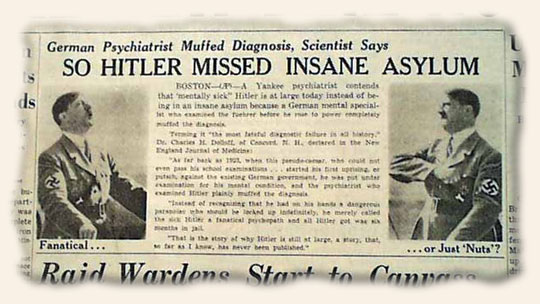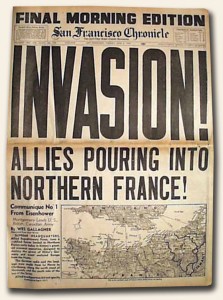They Put It In Print… How to hate – 1941…
September 22, 2019 by GuyHeilenman · Leave a Comment
As we were searching through our issues from 1941 looking for new WWII content, to our great dismay we discovered a article on page 3 of the San Francisco Chronicle dated November 15th headed: “Goebbels Tells Germans How To Hate Jews”, which was followed by his ten “reasons” to hate them. There are some who wish to ignore and/or deny the existence of the hatred which ran rampant during this time in world history, but thanks to the S.F. Chronicle, they put it in print:
Snapshot 1914 – the first warship passes through the Panama Canal…
June 25, 2019 by GuyHeilenman · 2 Comments
The following snapshot comes from the Boston Evening Transcript dated August 18, 1914, which announces the first-ever warship making its way through the Panama Canal. Quite historic.
Snapshot 1934… Adolf Hitler declares he will not go to war!
March 12, 2019 by GuyHeilenman · Leave a Comment
The following snapshot comes from the Chicago Daily Tribune dated August 6, 1934, which features Adolf Hitler’s Declaration that “War Means Ruin…Will Fight Only If Attacked.” At least he got the 1st part right.
They put it in print… Nazi generals attempt an escape to Japan…
July 27, 2015 by TimHughes · Leave a Comment
World War II created a countless number of stories of heroism, sorrow, courage, and intrigue, many of which will never be known save for just a few.
 The “The Detroit Free Press” of May 17, 1945 reported one such event which would surprise many historians today. Its headline notes: “Seize U-Boat Taking Key Nazis To Japan” with a subhead: “Luftwaffe Chiefs Captured at Sea“. This was just 10 days after the surrender of Germany, and less than 3 months before Japan would surrender to end World War II. The related article mentions in part: “A 1,600 ton Nazi U-boat, presumably attempting to escape to Japan, surrendered to destroyer-escorts of the U.S. Atlantic Fleet…Aboard were 3 major general of the Luftwaffe and two dead Japanese, who had committed hara-kiri…”.
The “The Detroit Free Press” of May 17, 1945 reported one such event which would surprise many historians today. Its headline notes: “Seize U-Boat Taking Key Nazis To Japan” with a subhead: “Luftwaffe Chiefs Captured at Sea“. This was just 10 days after the surrender of Germany, and less than 3 months before Japan would surrender to end World War II. The related article mentions in part: “A 1,600 ton Nazi U-boat, presumably attempting to escape to Japan, surrendered to destroyer-escorts of the U.S. Atlantic Fleet…Aboard were 3 major general of the Luftwaffe and two dead Japanese, who had committed hara-kiri…”.
To this day few know of the attempt of Nazi generals to seek refuge in Japan, yet it was a front page headline in Detroit at the time.
Ironically, the photo shown is actually of the capture/surrender of the infamous U-505, an event which had occurred in June of 1944, but was not announced/released until the previous day.
A movie in the making?
AND as for stating the obvious… Hitler insane?
October 18, 2013 by GuyHeilenman · Leave a Comment
We recently discovered a surprisingly interesting article in the Minneapolis Morning Star for June 30, 1942. At first glance it seems to state the obvious. However, upon further reflection, it might be interesting to explore the backstory as to the motivation behind his 1923 evaluation. Perhaps there is nothing here to uncover, but it makes one wonder.
Headlines drive interest in World War II…
March 11, 2013 by TimHughes · 2 Comments
For likely a multitude of reasons, interest in World War II newspapers ranks far higher than in the Korean War, World War I, or the Spanish-American War. It may be a generational thing, as most collectors today are children of World War II veterans and likely heard stories of the war first-hand, or found  newspapers in their parents attics which sparked an interest. One could debate a number of other possible reasons why other wars lack the intrigue found in that fought by the “greatest generation”.
newspapers in their parents attics which sparked an interest. One could debate a number of other possible reasons why other wars lack the intrigue found in that fought by the “greatest generation”.
Headline collecting has always been a focus for this hobby, and as any collector knows, bold, banner headlines did not become commonplace until late in the 19th century. With the increasing competitiveness of daily newspapers across the country–Hearst, Pulitzer & others rising to prominence–flashier front pages were needed to draw attention at the corner news stand. It’s a shame there is not more interest in the Spanish-American War and World War I as both events resulted in some huge, dramatic, & very displayable headlines.
Because there are a plethora of newspapers from the WWII era available, collectors have become very discriminating in what they collect. Only the “best of the best” will do, meaning just the major events and only those with huge and displayable headlines. If there is a “top 6” list of sought-after events, our experience is they would be: 1) attack on Pearl Harbor; 2) the D-Day invasion; 3) death of Hitler; 4) end of the war in Europe; 5) dropping of the atomic bomb; 6) end of the war in the Pacific. One could add any number of other battle reports such as Midway, battle of the Bulge, fall of Italy, Iwo Jima, battle for Berlin, and so much more. And we could step back before American involvement in the war and add Hitler’s invasion of Poland and the battle of Britain.
The bigger the headline the better. With some newspapers the entire front page was taken up with a headline and a related graphic. The U.S. flag was a common patriotic device. Tabloid-size newspapers commonly had the front page entirely taken up with a singular headline and tend to be better for display given their smaller size.
 And not just American newspapers draw interest. German newspapers hold a special intrigue, but the language barrier is a problem for many. But the British Channel Islands, located in the English Channel between England & France, were occupied by the Nazi during the war so their reports were very pro-Nazi while printed in the English language (ex., Guernsey Island). And the military newspaper “Stars and Stripes“, while certainly being American, was published at various locations in Europe and the Pacific. Collectors have a special interest in finding World War II events in the official newspapers of the American military forces. Plus there were a multitude of “camp” newspapers, amateur-looking newspapers printed on a mimeograph machine for consumption limited to a military base, and typically printed is very small quantities. Their rarity is not truly appreciated by many.
And not just American newspapers draw interest. German newspapers hold a special intrigue, but the language barrier is a problem for many. But the British Channel Islands, located in the English Channel between England & France, were occupied by the Nazi during the war so their reports were very pro-Nazi while printed in the English language (ex., Guernsey Island). And the military newspaper “Stars and Stripes“, while certainly being American, was published at various locations in Europe and the Pacific. Collectors have a special interest in finding World War II events in the official newspapers of the American military forces. Plus there were a multitude of “camp” newspapers, amateur-looking newspapers printed on a mimeograph machine for consumption limited to a military base, and typically printed is very small quantities. Their rarity is not truly appreciated by many.
For obvious reasons, there is also a high degree of collectible interest from those wishing to make sure certain aspects of history are not forgotten. The Holocaust, and the Nazi propaganda used to provide a rationale for eliminating the Jewish people, is well documented in newspapers from the era. In addition to the Holocaust and its atrocities, issues providing context through reporting other pre-war events such as the Great Depression, fascism, and increased militarism, are also desirable.
True to any collectable field, newspaper collectors are always on the lookout for an issue better than what they have, and collection upgrades are constant. Finding that special, rare, unusual or fascinating headline is what makes the hobby fun. Will interest in the Korean War and the Vietnam War gain more interest in future years? Perhaps so. With interest currently low and availability and prices very attractive, it might be a good time to explore.




